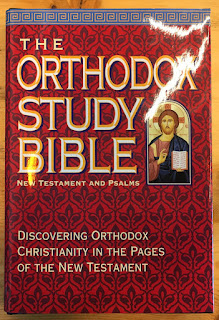 |
| Last week |
Dr. Stephen Wellum was one of my theological advisers while I was attending Canadian Baptist Seminary/Trinity Western University, working on my MTS (Master of Theological Studies).
As my BA was within a Mennonite Brethren context and culture, and in Biblical Studies and not Theology, technically; Dr. Wellum assisted me with sources and knowledge in regards to Reformed theology and in particular, the work of John S. Feinberg, that was in the future, my key Reformed exemplar for my British MPhil/PhD theses.
I certainly had Reformed leanings while at Columbia Bible College for my BA, but waited until I earned my MPhil at Wales, before publicly embracing the term 'Reformed' for myself.
Online, I came across some of Dr. Wellum's recent work (italics). My work as is Dr. Wellum's, is non-exhaustive.
The Hill We All Must Die
On Four Questions to Ask About Atonement
By Dr. Stephen Wellum
Tuesday, February 18, 2020: The atonement is essential: Part I
Cited
1. Who Is God?
First, we must get right who God is as our triune Creator-Covenant Lord. Mark it well: debates over the nature of the atonement are first and foremost doctrine of God debates. If our view of God is sub-biblical, we will never get the cross right. From the opening verses of Scripture, God is presented as eternal, a se (life from himself), holy love, righteous, and good — the triune God who is complete in himself and who needs nothing from us (Genesis 1–2; Psalm 50:12–14; Isaiah 6:1–3; Acts 17:24–25; Revelation 4:8–11). One crucial implication of this description is that God, in his very nature, is the moral standard of the universe. This is why we must not think of God’s law as something external to him that he may relax at will. Instead, the triune God of Scripture is the law; his will and nature determine what is right and wrong.
---
I agree that biblical theology in regards to the nature of atonement connects to biblical theology in regards to the nature of God. God's infinite, eternal, holy, perfectly moral, nature, requires any and all finite entities that would ever have everlasting life to ontologically (in regards to nature) possess a finite form of holiness and moral perfection. Genesis 3 from the Hebrew Bible, records the fall of humanity and the New Testament (Romans, Galatians, Ephesians, Hebrews, as examples) explains that the atoning and resurrection work of Jesus Christ is the divine remedy for that human fall.
From 2010 Theodicy and Practical Theology: PhD thesis, the University of Wales, Trinity Saint David, Lampeter
Edited
I note the fall because Augustine describes a literal fall. Augustine (426)(1958: 254-255), and the corruption of humanity that led to the literal problem of evil. Augustine (426)(1958: 254-255). For many secular and Biblical scholars from mainline denominations, the Biblical story of the fall is likely fiction. Jackson (1941)(2006: 1). Fretheim (1994: 152). To Feinberg, human freedom and all human attributes had been tainted by the corruption of humanity in the fall. Feinberg (1994: 126-127). I discuss Genesis and the fall in Chapter Two of my PhD thesis and I am not convinced that all of the creation account must be taken plain literally in order to stay true to Scripture. Figurative literal approaches are possible at some points.
My British PhD work at Wales was required to be diverse in my discussion in regards to the fall.
February 24, 2020
Within my biblical, Reformed theology, I certainly view, based on Romans 5, as a key example, Jesus Christ, the God-man, as the last Adam, and therefore fully accept an actual, non-fictional, historical Adam and Eve. However, Genesis 1-3 allows for interpretations that can be figurative literal while rejecting mythology. In other words, a literal, historical Adam and Eve could be explained with both prose and poetry.
William Sanford La Sor, David Allan Hubbard, and Fredric William Bush (1987) from what I deduced was a moderate conservative, evangelical position, reason the author of Genesis is writing as an artist and storyteller who uses literary device. La Sor, Hubbard, and Bush (1987: 72). They point out it is imperative to distinguish which literary device is being used within the text of Genesis. La Sor, Hubbard, and Bush (1987: 72).
Romans 5 (New American Standard Bible)
12 Therefore, just as through one man sin entered into the world, and death through sin, and so death spread to all men, because all sinned— 13 for [h]until the Law sin was in the world, but sin is not imputed when there is no law. 14 Nevertheless death reigned from Adam until Moses, even over those who had not sinned in the likeness of the offense of Adam, who is a [i]type of Him who was to come. h. Romans 5:13 Or until law i. Romans 5:14 Or foreshadowing
---
I further agree with Dr. Wellum that God is the moral standard of the universe, his infinite, eternal, holy and perfect nature, makes it so. God's law and moral law especially, is a reflection of his divine nature, and therefore to live everlastingly within the future culminated Kingdom of God, atonement (and resurrection) is required for humanity corrupted within this present, temporary (Revelation 21-22) realm.
The Resurrection
1 Corinthians 15 (New American Standard Bible)
42 So also is the resurrection of the dead. It is sown [l]a perishable body, it is raised [m]an imperishable body; 43 it is sown in dishonor, it is raised in glory; it is sown in weakness, it is raised in power; 44 it is sown a natural body, it is raised a spiritual body. If there is a natural body, there is also a spiritual body. 45 So also it is written, “The first man, Adam, became a living soul.” The last Adam became a life-giving spirit. 46 However, the spiritual is not first, but the natural; then the spiritual. 47 The first man is from the earth, [n]earthy; the second man is from heaven. 48 As is the earthy, so also are those who are earthy; and as is the heavenly, so also are those who are heavenly. 49 Just as we have borne the image of the earthy, [o]we will also bear the image of the heavenly. l. 1 Corinthians 15:42 Lit in corruption m. 1 Corinthians 15:42 Lit in incorruption n. 1 Corinthians 15:47 Lit made of dust o. 1 Corinthians 15:49 Two early mss read let us also
50 Now I say this, brethren, that flesh and blood cannot inherit the kingdom of God; nor does [p]the perishable inherit [q]the imperishable. p. 1 Corinthians 15:50 Lit corruption q. 1 Corinthians 15:50 Lit incorruption
Even with the use of philosophy of religion (examining religion philosophically), the first cause, the primary cause, that exists as necessary in any possible world, as of necessity would be, by ontological default, what is good and holy. Finite, contingent human beings, soiled and engulfed by moral imperfection and problems of evil would not be by nature fit for everlasting life in the presence of such an entity. Reasonably within a type of theistic philosophy of religion, there is a fracture between humanity and God. Divine atonement is the fix. This makes reasonable sense to me primarily theologically (from the bible) and secondarily through philosophy of religion.
AUGUSTINE (398-399)(1992) Confessions, Translated by Henry Chadwick, Oxford, Oxford University Press.
AUGUSTINE (400-416)(1987)(2004) On the Trinity, Translated by Reverend Arthur West Haddan, in Nicene and Post-Nicene Fathers, Series One, Volume 3, Denver, The Catholic Encyclopedia.
AUGUSTINE (421)(1998) Enchiridion, Translated by J.F. Shaw, Denver, The Catholic Encyclopedia. AUGUSTINE (426)(1958) The City of God, Translated by Gerald G. Walsh, Garden City, New York, Image Books.
AUGUSTINE (427)(1997) On Christian Doctrine, Translated by D.W. Robertson Jr., Upper Saddle River, N.J., Prentice Hall.
AUGUSTINE (427b)(1997) On Christian Teaching, Translated by R.P.H. Green, Oxford, Oxford University Press.
FEINBERG, JOHN S. (1994) The Many Faces of Evil, Grand Rapids, Zondervan Publishing House.
FEINBERG, JOHN.S. (2001) No One Like Him, John S. Feinberg (gen.ed.), Wheaton, Illinois, Crossway Books.
FRETHEIM, TERENCE E. (1985)(2005) ‘The Suffering of God: An Old Testament Perspective’, in Theology Today, Volume 1, Number 1, Bookreview17. Princeton, Princeton Theological Seminary. http://theologytoday.ptsem.edu/apr1985/v42-1-bookreview17.htm
JACKSON, JOHN G. (1941)(2006) Pagan Origins of the Christ Myth, New York, Truth Seeker Co. http://www.nbufront.org/html/MastersMuseums/JGJackson/ChristMyth/ChristMythPart1.html
LA SOR, WILLIAM SANFORD, DAVID ALLAN HUBBARD, AND FREDERIC WILLIAM BUSH. (1987) Old Testament Survey, Grand Rapids, William B. Eerdmans Publishing Company.





